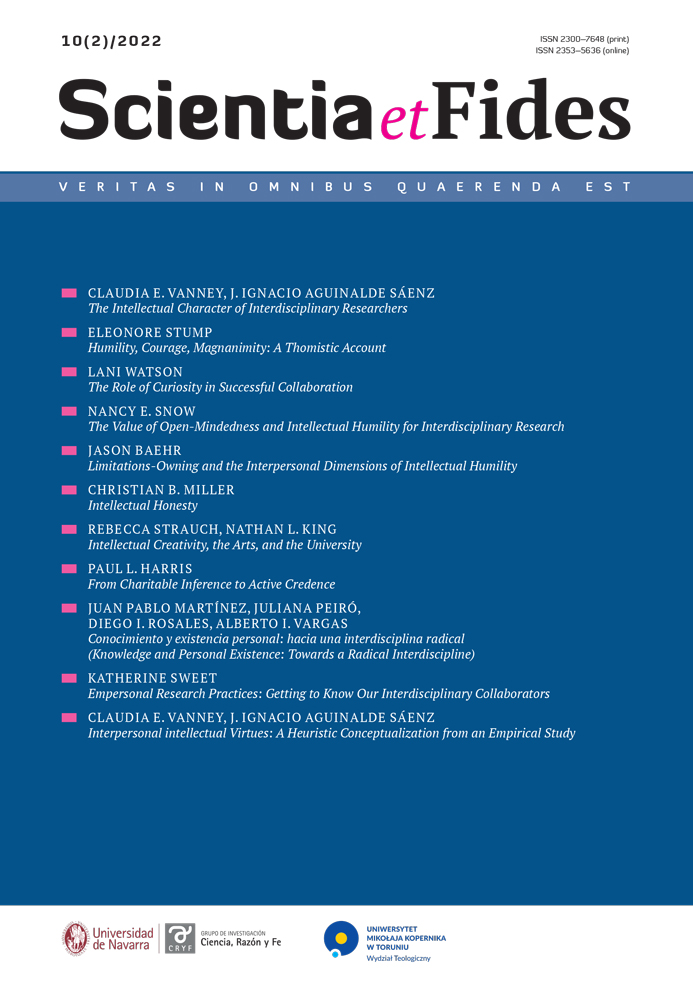Limitations-Owning and the Interpersonal Dimensions of Intellectual Humility
DOI:
https://doi.org/10.12775/SetF.2022.019Keywords
intellectual humility, intellectual limitations, limitations-owning, interpersonal dimensions of intellectual humilityAbstract
According to one prominent account of intellectual humility, it consists primarily of a disposition to “own” one’s intellectual limitations. This account has been criticized for neglecting the interpersonal dimensions of intellectual humility. We expect intellectually humble persons to be respectful and generous with their interlocutors and to avoid being haughty or domineering. I defend the limitations-owning account against this objection. I do so in two ways: first, by arguing that some of the interpersonal qualities associated with intellectual humility are qualities expressive of virtues other than intellectual humility; and second, by arguing that, when properly described, the kind of limitations-owning characteristic of intellectual humility in fact is robustly interpersonal. The result is a considerably broader and richer notion of the limitations the owning of which is characteristic of intellectual humility.
References
Fricker, Miranda. 2007. Epistemic Injustice (Oxford: Oxford University Press).
Nadelhoffer, Thomas, and Jennifer Cole Wright. 2017. “The Twin Dimensions of the Virtue of Humility: Low Self-focus and High Other-Focus,” in Moral Psychology: Virtue and Character, eds. Walter Sinnott-Armstrong and Christian Miller (Boston: MIT Press): 309-342.
Porter, Tennelle, Chayce Baldwin, Michael Warren, Elise Murray, Kendall Cotton Bronk, Marie Forgeard, Nancy Snow and Eranda Jayawickreme. 2021. “Clarifying the Content of Intellectual Humility: A Systematic Review and Integrative Framework,” Journal of Personality Assessment, DOI: 10.1080/00223891.2021.1975725.
Priest, Maura. 2017. “Intellectual Humility: An Interpersonal Theory,” Ergo 4: 463-80
Roberts, Robert and Jay Wood. 2007. Intellectual Virtues (Oxford: Oxford University Press, 2007).
Roberts, Robert and Jay Wood. 2003. “Intellectual Humility,” in Intellectual Virtue: Perspectives from Ethics and Epistemology, eds. Michael DePaul and Linda Zagzebski (Oxford: Oxford University Press): 111-134.
Roberts, Robert and Ryan West. 2017. “Jesus and the Virtues of Pride,” in The Moral Psychology of Pride, eds. J. Adam Carter and Emma Gordon (Lanham, MD: Rowman and Littlefield): 99-122.
Snow, C.P. 1958. The Search (Middlesex, England: Penguin Books).
Whitcomb, Dennis, Heather Battaly, Jason Baehr, and Daniel Howard-Snyder. 2017. “Intellectual Humility: Owning Our Limitations,” Philosophy and Phenomenological Research 94: 509-539.
Downloads
Published
How to Cite
Issue
Section
License
Copyright (c) 2022 Jason

This work is licensed under a Creative Commons Attribution-NoDerivatives 4.0 International License.
CC BY ND 4.0. The Creator/Contributor is the Licensor, who grants the Licensee a non-exclusive license to use the Work on the fields indicated in the License Agreement.
- The Licensor grants the Licensee a non-exclusive license to use the Work/related rights item specified in § 1 within the following fields: a) recording of Work/related rights item; b) reproduction (multiplication) of Work/related rights item in print and digital technology (e-book, audiobook); c) placing the copies of the multiplied Work/related rights item on the market; d) entering the Work/related rights item to computer memory; e) distribution of the work in electronic version in the open access form on the basis of Creative Commons license (CC BY-ND 3.0) via the digital platform of the Nicolaus Copernicus University Press and file repository of the Nicolaus Copernicus University.
- Usage of the recorded Work by the Licensee within the above fields is not restricted by time, numbers or territory.
- The Licensor grants the license for the Work/related rights item to the Licensee free of charge and for an unspecified period of time.
FULL TEXT License Agreement
Stats
Number of views and downloads: 1005
Number of citations: 0



